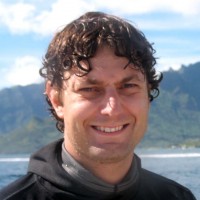Michael Berumen
PhD Graduate
James Cook University

From 2005 to 2022, the main node of the ARC Centre of Excellence for Coral Reef Studies was headquartered at James Cook University in Townsville, Queensland (Australia)








After finishing his PhD, Michael returned to his home state of Arkansas and spent two years working on as a postdoc and a Visiting Assistant Professor in the biology department of the University of Arkansas. In 2007, he took a position as a Postdoctoral Scholar in the Fish Ecology Lab at the Woods Hole Oceanographic Institution (WHOI). Recently he joined the King Abdullah University of Science and Technology where he is helping to get the Red Sea Research Center up and running. His lab is involved in nutritional ecology of corallivorous fishes, movement ecology of adult fishes within and among reefs, seascape connectivity – large-scale movements of large fish (tunas, sharks, etc), larval connectivity, fisheries studies, including life history, population genetics, and connectivity of targeted reef fishes, evolutionary biology and ecology of Red Sea fishes. In 2008, Michael was named a Sir Keith Murdoch Fellow by the American Australian Association to do several months of fieldwork on the Great Barrier Reef.
New DNA techniques are being used to understand how coral reacted to the end of the last ice age in order to better predict how they will cope with current changes to the climate. James Cook Univer
A new study on the effects of climate change in five tropical countries has found fisheries are in more trouble than agriculture, and poor people are in the most danger. Distinguished Profess
James Cook University researchers have found brightly coloured fish are becoming increasingly rare as coral declines, with the phenomenon likely to get worse in the future. Christopher Hemingson, a
Researchers working with stakeholders in the Great Barrier Reef region have come up with ideas on how groups responsible for looking after the reef can operate more effectively when the next bleaching
Abstract: As marine species adapt to climate change, their heat tolerance will likely be under strong selection. Individual variation in heat tolerance and its heritability underpin the potential fo
Abstract: The Reef Ecology Lab in KAUST’s Red Sea Research Center explores many aspects of movement ecology of marine organisms, ranging from adult migrations to intergenerational larval dispersal
Abstract: Macroalgal meadows are a prominent, yet often maligned component of the tropical seascape. Our work at Ningaloo reef in WA demonstrate that canopy forming macroalgae provide habitat for ad
Abstract: Sharks are generally perceived as strong and fearsome animals. With fossils dating back at least 420 million years, sharks are not only majestic top predators but they also outlived dinosa
Abstract: Connectivity plays a vital role in many ecosystems through its effects on fundamental ecological and evolutionary processes. Its consequences for populations and metapopulations have been
Abstract: Evolution of many eukaryotic organisms is affected by interactions with microbes. Microbial symbioses can ultimately reflect host’s diet, habitat range, and even body shape. However, how
Abstract: The past few years have seen unprecedented coral bleaching and mortality on the Great Barrier Reef (GBR) but the consequences of this on biodiversity are not yet known. This talk will expl